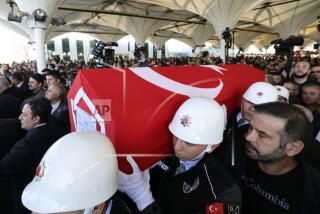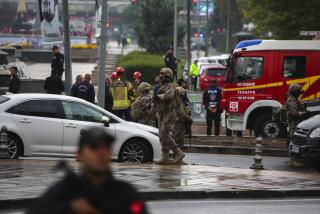Kurdish Rebel Group Warily Watches Americans’ Moves
- Share via
DIYARBAKIR, Turkey — Faruk Yigit was just 18 when he headed for the rugged mountains bordering Iraq in 1992 to become a fighter for Kurdish independence against his traditional enemy, Turkey.
Everything changed when the U.S.-led coalition invaded Iraq this spring and unseated Saddam Hussein. As part of the war on terrorism, the United States pledged to take military action against about 5,000 Turkish Kurd rebels in the part of northern Iraq, who are controlled by the Kurdistan Workers Party, or PKK.
The PKK “will be gone because we have always said that one of the visions that all of us, Turks and Americans, have for Iraq is an Iraq that has no connection to terrorists, and the PKK is a terrorist organization,” Marc Grossman, U.S. undersecretary of State for political affairs, said in a recent interview with private Turkish news channel CNN-Turk.
The comments have fueled a growing fear of what the U.S. will do next.
“What I never imagined,” said Azize Yigit, 52, mother of nine children including Faruk, “was that he might be butchered by Americans instead” of by the Turks.
Turkey accuses the PKK of being a terrorist organization for waging a 15-year insurgency. But to millions of ethnic Kurds, the guerrillas are freedom fighters. Pressure on Washington to dislodge the rebels has been mounting in recent weeks as the Ankara government weighs whether to send up to 10,000 troops to help U.S. forces bring Iraq under control.
“The United States remains committed to working with Turkey to eliminate the PKK ... threat in Iraq, and to ensure that a free Iraq does not serve as a sanctuary for terrorists,” a State Department official said recently.
The official was careful not to link U.S. action against the PKK to Turkish cooperation on troops for Iraq.
“I don’t think there’s any explicit quid pro quo anyplace,” the official said. “But we’re working with them on PKK. We have been for a long time.”
For Turkey, the proposal to send troops is aimed at mending relations with the U.S. while giving Turkey a say in shaping the future of its Arab neighbor to the south. Turkish officials have made it clear that they expect the U.S. to disarm and evict the PKK in exchange for the help.
Turkey’s ruling Justice and Development Party is expected to come up with a final decision on dispatching forces in the coming days and will probably present a motion to parliament authorizing their deployment next month, said Murat Mercan, a party legislator. Even though a majority of Turks are opposed to the move, Mercan insists that “the motion will pass this time for sure.”
On March 1, parliament rejected a bill to allow thousands of U.S. combat troops to use Turkey as a launching pad to invade northern Iraq, straining Ankara’s relations with Washington.
Acrimony between the traditional allies mounted in July when U.S. troops captured 11 Turkish special forces in the Kurdish-controlled Iraqi city of Sulaymaniyah and accused them of plotting to kill a Kurdish governor from the oil-rich Iraqi province of Kirkuk.
About 3,000 Turkish troops are deployed in northern Iraq to hunt down PKK rebels. Iraqi Kurdish leaders say the soldiers are there to undermine Kurdish self-rule, which Turkey fears could reignite separatist passions among its own 12 million Kurds. Both the Iraqi Kurds and the U.S. want the Turks to pull out of northern Iraq, and stress that any Turkish military presence would be welcome only outside the Kurdish zone. Turkey’s military leaders have pledged to withdraw from northern Iraq once the PKK is gone.
The dilemma for U.S. policymakers, according to some Western analysts, is how to move against the PKK without risking further instability in Iraq.
“The U.S. is in so much trouble in central and southern Iraq that I don’t believe there’s much stomach for action in the one place [the Kurdish-controlled north] that’s in good shape,” Peter Galbraith, a retired U.S. ambassador and expert on Iraq, said in a telephone interview.
Bulent Aliriza, an expert on Turkey at the Washington-based Center for Strategic and International Studies, argues that the U.S. has not acted against the PKK so far because “its military machine in Iraq is overstretched and its decision-making process overloaded.” But failure to do so ahead of any further Turkish troop deployment in Iraq would be wrong, he said, and would lead to further “Sulaymaniyah-type dust-ups between the Americans and Turks.”
A U.S. failure to act against the rebel group would also make it harder for the Turkish government to justify potential casualties in Iraq to the public.
Counted among the world’s toughest guerrilla groups and deployed in the forbidding Qandil mountain range separating Iraq from Iran, the PKK has said it would resist any U.S. attack. The rebels also have threatened to end on Monday a cease-fire declared after the capture of their leader, Abdullah Ocalan, in 1999 and to carry their armed battle outside Turkey’s predominantly Kurdish southeastern region to urban centers in the country’s west.
“Violence could resume and on a much broader scale,” warned Firat Anli, chairman of the Diyarbakir branch of Turkey’s largest legal pro-Kurdish party, Dehap. Like many here, Anli points out that anti-American feelings fed by tacit U.S. backing for Turkey’s campaign against the rebels -- both in providing weapons to the Turkish army and providing intelligence that led to Ocalan’s capture in Kenya -- had eased over the last year because of perceived U.S. support for Kurdish autonomy in Iraq.
“Now we see that the Americans are applying double standards again, with the Iraqi Kurds treated as the good guys and our [Turkish] Kurds as the bad guys,” said Ahmet Turan Demir, who leads a smaller pro-Kurdish group.
*
Times staff writer Sonni Efron in Washington contributed to this report.
More to Read
Sign up for Essential California
The most important California stories and recommendations in your inbox every morning.
You may occasionally receive promotional content from the Los Angeles Times.









